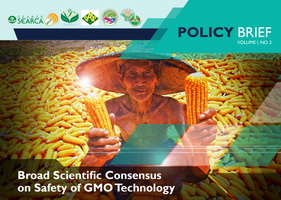
SEARCA BIC Policy Brief Highlights Global Scientific Consensus on the Safety of GMO Technology
February 20, 2019| |
 Despite the national policy on safe and responsible use of modern biotechnology, several local government units in the Philippines have passed resolutions and ordinances banning genetically modified (GM) crops in their respective areas. Across the globe, particularly in Europe, there are still many skeptics who refuse to recognize the potential benefits of GMO technology to raise farmers' income and yields, improve adaptation to climate change, and increase the crop's nutrient content.
Despite the national policy on safe and responsible use of modern biotechnology, several local government units in the Philippines have passed resolutions and ordinances banning genetically modified (GM) crops in their respective areas. Across the globe, particularly in Europe, there are still many skeptics who refuse to recognize the potential benefits of GMO technology to raise farmers' income and yields, improve adaptation to climate change, and increase the crop's nutrient content.
Dr. Emil Q. Javier, a member of the National Academy of Science and Technology (NAST) and Chair of the Coalition for Agricultural Modernization in the Philippines, Inc. (CAMP), puts the spotlight on the scientific consensus in favor of GM technology based on published statements of the world's leading academies of science and responsible agencies. This is published as the third policy brief produced by SEARCA Biotechnology Information Center (SEARCA BIC).
These statements essentially validate the potential of GMO technology to increase and improve the efficiency of production of main food staples, reduce the environmental impact of agriculture, and provide access to food for small-scale farmers. The global scientific community concurred that GMO technology are no more risky than conventional plant breeding technologies. They also attested that these technologies are safe and that no effects on human health have been shown as a result of consumption of GM foods.
The 2018 Policy Brief series is produced and disseminated in partnership with the International Service for the Acquisition of Agri-biotech Applications (ISAAA), Coalition for Agriculture Modernization in the Philippines (CAMP), Department of Agriculture-Biotechnology Program Office (DA-BPO), Program for Biosafety Systems (PBS), and DA-Bureau of Agricultural Research (DA-BAR). For more details, read the full policy brief.
| |
Biotech Updates is a weekly newsletter of ISAAA, a not-for-profit organization. It is distributed for free to over 22,000 subscribers worldwide to inform them about the key developments in biosciences, especially in biotechnology. Your support will help us in our mission to feed the world with knowledge. You can help by donating as little as $10.
-
See more articles:
-
News from Around the World
- Hunger in Africa Continues to Rise, UN Report Reveals
- New Biotech Cotton Event Approved in Argentina
- Epigenetics Research Could Lead to More Resilient Crops
- ERS Publishes Report on Development, Adoption, and Management of Drought Tolerant Corn in the United States
- Battle to Save the US Citrus Industry Hinges on Consumer Acceptance of GM Food
- SEARCA BIC Policy Brief Highlights Global Scientific Consensus on the Safety of GMO Technology
- New Evidence on Vernalization Has Been Found
- Wageningen Economic Research Conducts Comparative Analysis of Global Agricultural Policies for the EU
-
Research Highlights
- Overexpression of OsFTL10 Induces Early Flowering Improves Drought Tolerance in Rice
- Co-expression of Soybean Genes Leads to Improved Folate Content in Maize and Wheat
-
Announcements
- Global Congress on Biotechnology
-
Resources
- Gene Editing: A Potential GameChanger for Crop Agriculture
- ISAAA in 2018: Accomplishment Report
-
Plant
- CRISPR-Cas9 Mutations in a Rice Gene Changes Starch Biosynthesis in the Endosperm
- Transgene-Free Genome Editing in Tomato and Potato Plants Using CRISPR-Cas9 Cytidine Base Editor
-
Read the latest: - Biotech Updates (January 21, 2026)
- Gene Editing Supplement (January 28, 2026)
- Gene Drive Supplement (February 22, 2023)
-
Subscribe to BU: - Share
- Tweet
